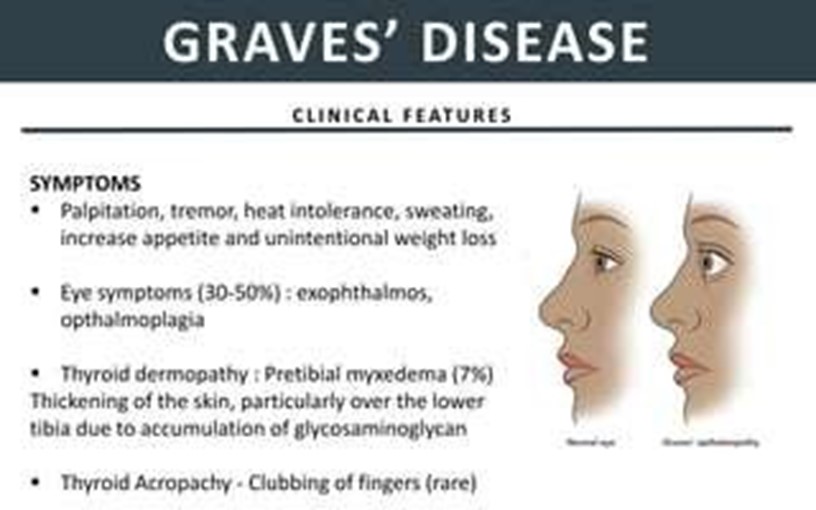A client who has Graves' disease is prescribed methimazole.
Which of the following effects should the nurse expect to see after the client has taken the medication for 2 months?
Weight loss.
Warmer skin.
Increase in pulse rate.
Increased sleeping.
The Correct Answer is D

Methimazole is an antithyroid medication that controls the overproduction of thyroid hormone in Graves’ disease.
One of the symptoms of Graves’ disease is difficulty sleeping due to the overproduction of thyroid hormone.
After taking methimazole for 2 months, the client’s thyroid hormone levels should decrease, leading to an improvement in sleep.
Choice A is wrong because weight loss is a symptom of Graves’ disease due to the overproduction of thyroid hormone.
Methimazole controls the overproduction of thyroid hormone and may lead to weight gain.
Choice B is wrong because warmer skin is a symptom of Graves’ disease due to the overproduction of thyroid hormone.
Methimazole controls the overproduction of thyroid hormone and may lead to cooler skin.
Choice C is wrong because an increase in pulse rate is a symptom of Graves’ disease due to the overproduction of thyroid hormone.
Methimazole controls the overproduction of thyroid hormone and may lead to a decrease in pulse rate.
Nursing Test Bank
Naxlex Comprehensive Predictor Exams
Related Questions
Correct Answer is B
Explanation
Ranitidine is a histamine H2-receptor antagonist that blocks histamine-mediated gastric acid secretion.

Antacids can interfere with the absorption of ranitidine, so it is important to separate their administration by at least 1 hour.
Choice A is wrong because aspirin is a type of nonsteroidal anti-inflammatory drug (NSAID) which can increase the risk of peptic ulcers.
Choice C is wrong because fine hand tremors are not a known side effect of ranitidine.
Choice D is wrong because there is no need to avoid dairy products when taking ranitidine.
Correct Answer is A
Explanation
Discard the vial of medication if the solution is cloudy.
This is because epoetin alfa should not be used if it has been frozen or if it has changed color or has particles in it.
Choice B is wrong because the vial should not be shaken before use.
Choice C is wrong because epoetin alfa should not be diluted with sterile water or any other liquid.
Choice D is wrong because epoetin alfa should not be frozen and therefore does not need to be thawed before administration.
Whether you are a student looking to ace your exams or a practicing nurse seeking to enhance your expertise , our nursing education contents will empower you with the confidence and competence to make a difference in the lives of patients and become a respected leader in the healthcare field.
Visit Naxlex, invest in your future and unlock endless possibilities with our unparalleled nursing education contents today
Report Wrong Answer on the Current Question
Do you disagree with the answer? If yes, what is your expected answer? Explain.
Kindly be descriptive with the issue you are facing.
